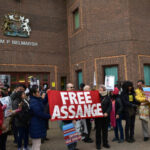Extradition Draws Closer for Assange, as Key Appeals Avenue Refused

The UK Supreme Court last week denied an appeal filed by Julian Assange against the 10 December 2021 decision of the UK High Court to extradite the Australian journalist to the United States.
The appeal application was based on the suicide risk the WikiLeaks found poses if detained within the US prison system, which was the ground of contention thought most likely succeed. However, the court found the document failed to “raise an arguable point of law”.
The case will now be returned to original District Court Judge, Vanessa Baraitser, to then pass on the court’s determination to extradition trigger-happy UK home secretary Priti Patel to make the final decision.
Assange is facing a US indictment, which contains 17 espionage charges and one of hacking, which overall carry a 175 year maximum penalty. The charges relate to the 2010-11 publishing of leaked classified files that revealed a plethora of US war crimes perpetrated in Iraq and Afghanistan.
If Patel approves extradition, it’s at this point that Assange’s legal team can launch one final challenge via grounds raised and denied at initial lower court hearings, which include the political nature of the case, as well as Washington having acted unlawfully during this process.
Via any means
From the early days of the leaks, it was clear the White House was none too pleased with the Townsville-born man airing out its criminal laundry.
This is an act that many consider to be the most important piece of journalism of the 21st century. Although, others take affront to Julian even being considered a journalist.
Back in 2012, after fearing a backdoor extradition attempt by the US via his fronting up in Sweden to face an arrest warrant, Assange sought refuge in London’s Ecuadorian Embassy for the period of seven years. And the Obama administration eventually dropped its pursuit of the Australian.
However, in 2017, when Wikileaks commenced publishing the CIA’s secret hacking manual, Vault 7, which contains its extralegal capabilities to surveil the entire globe, then head of the US intelligence agency Mike Pompeo pushed the Trump administration to go after the “non-state hostile” actor.
And while the UK and the US have proceeded like Assange is receiving utmost due process, the case has been rocked by multiple scandals, such as CCTV spying in the embassy, false evidence included in the US indictment and White House considerations on whether to kidnap or even kill the journalist.
Turning the other way
Doctors for Assange has consistently been warning the Australian and UK governments that the Wikileaks founder may not survive his continued imprisonment – which began in April 2019 and for the most part has seen him held on remand – due to his seriously ailing health.
Baraitser’s original January 2021 decision not to extradite hinged on Assange’s health and the likelihood that the US would hold him under its most severe detention regime. Yet, her decision was overturned after Washington asserted on appeal that he could serve his sentence in this country.
For its part, the Morrison government has simply ignored the plight of its own citizen and its obligations to him, whilst it pursues multiple political prosecutions of its own, targeting individuals who have exposed Australian government corruption.
The unstated federal Coalition line here being crucify the inconvenient truthteller at all costs.







